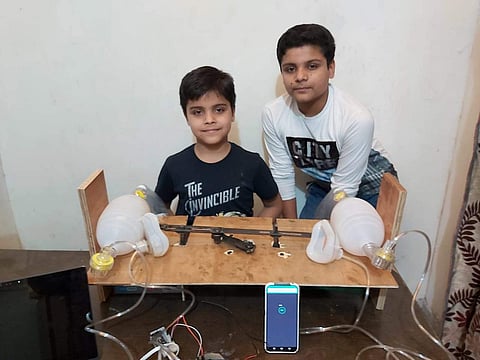

While experts, innovators, entrepreneurs across the country are trying their best to come up with solutions to fight the COVID-19 pandemic, this eight-year-old and 12-year-old brother duo from Haryana has developed low-cost automatic sanitiser dispensers and ventilators to help reduce contact between healthcare workers and positive patients. Vinayak and Kartik Tara created these dispenser prototypes at a bare minimum cost and once completed they can be installed at hospitals, vegetable mandis, kirana stores, police stations, and even police vans.
Kartik Tara, who studies in Class 8, says, "Since the lockdown, we have been seeing news all over the internet, television about how Corona has affected countries, people and economies at a large scale. We got inspired by Prime Minister Narendra Modi’s initiatives along with a few other start-ups coming up with solutions. I wanted to contribute to society and promote Skill India." While his brother Vinayak, who studies in Class 4 quips excitedly, "I am really happy that we created something that will help hospitals and public places."
The duo has been pursuing a course in robotics for four years through RoboChamps, an Edutech start-up. With this initiative, they aim to help Prime Minister Narender Modi in this fight and seek the support of the Government to make these models in bulk quantity for hospitals to overcome shortage immediately. RoboChamps introduces kids to Artificial Intelligence and its applications and provides hands-on learning about robotics in schools.
A number of medical staff including doctors and nurses in India have reportedly been getting infected while treating patients. People walking down the streets to buy essentials could also potentially spread the virus. Therefore, to curb the spread further and help the frontline staff, the duo created the automatic sanitiser dispenser prototype that can detect a hand from a range of two centimetres. It works in the same manner in which automatic taps work in malls but the interesting aspect is that it has been built within a price bracket of Rs 850. Robochamps the guiding inspiration for these kids is aiming to deliver hundreds of products immediately and has urged for the support of the Indian government.
Similarly, the kids have created automatic ventilator prototypes by converting the existing manual ventilators available in the market. A balloon-like structure is compressed by a motor between two wooden walls (acting as hands) set at a particular speed and time as the ventilator is connected to the circuit and interfaced with a mobile app so that patient's health can be monitored closely through the app. The entire design is created to be economically viable within a price range of Rs 1560. The working prototype is tested and proven to be successful and can be helpful for medical staff and hospitals. The siblings conceptualised, designed and built the automated machines under the guidance of Akshay Ahuja the founder of RoboChamps. "Vinayak and Kartik had robotic classes in their school. They took a very active interest in robotics and later on, they joined Robochamps and started travelling to Chandigarh from Ambala every day. Akshay was training Vinayak and Kartik and interestingly both the kids created 15 types of different robots and got their name in the India Book of World Records," the siblings' mother Meenakshi Tara adds.
Speaking on the automated ventilators, Akshay says, "Currently a lot of health establishments and bodies have been working on developing new prototypes of a ventilator using 3D printing to help with the shortage of ventilators, however, the model developed by our students is completely different as we are converting manual ventilators into automatic but the process will be the same, to pump the balloon and use two wooden walls instead of hands to avoid human interaction."
Currently, the brothers are working on two more robot prototypes. The first model will help deliver food to COVID-19 patients without human intervention. It will be customised as per beds in the hospital, the robot can supply food to every patient automatically. The robots are conceptualised at a nominal price which is equivalent to INR 2300. The second model will be a structure that can sanitise the whole body when someone passes through it. The structure can be installed in schools, malls, and all other crowded places once the lockdown is over.
